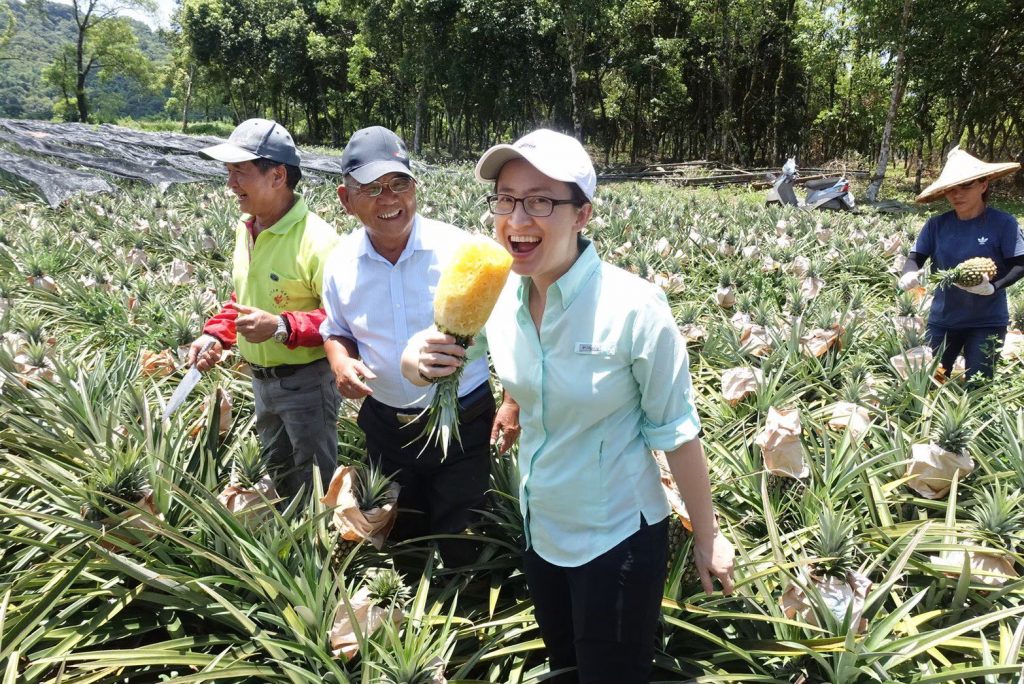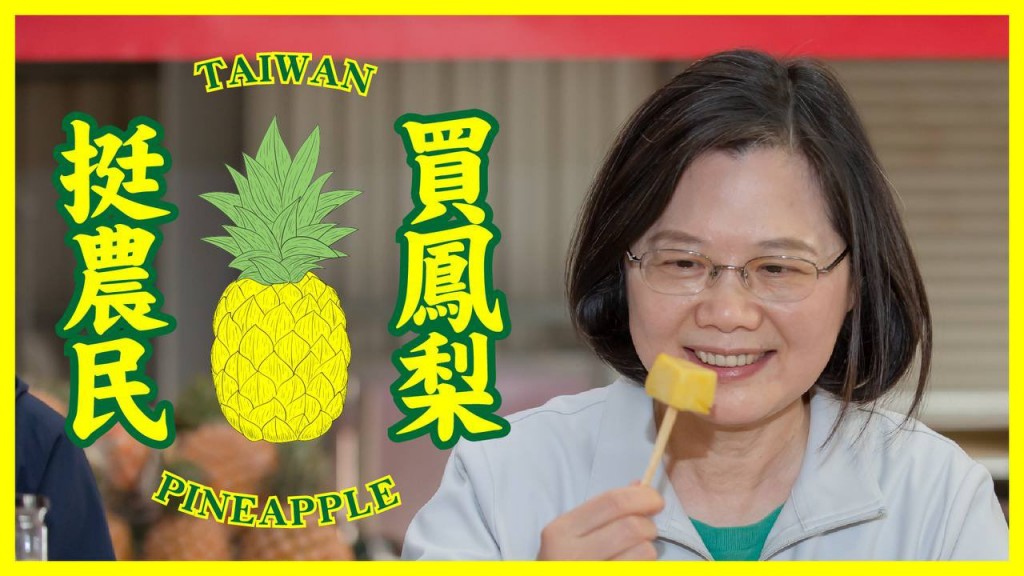
- China imposed a blanket ban on all imports of Taiwanese pineapples last week, alleging that “harmful organisms” had been found in the fruit.
- President Tsai condemned China for its “ambush-like, unilateral notice that it would ban imports of Taiwan pineapples”, despite the fact that 99.79 percent of imported batches had passed inspection.
- China’s move has been interpreted by observers in Taiwan as directed at the governing Democratic Progressive Party (DPP), which is frequently critical of China.
- Taiwanese Foreign Minister Joseph Wu launched the “Freedom Pineapple” campaign on Twitter. The aim of the online campaign was to secure orders for pineapple from farmers
- Taiwanese farmers received pre-orders for 41,687 tons of pineapples from companies, e-commerce platforms, and consumers, already exceeding the annual quantity of exports to China.
- With the call to take on the ban by China, Taiwanese businesses and citizens made up for the potential shortfall in sales by buying an entire year’s worth of the tropical fruit in just four days!
- The U.S., Japan, and Canadian embassies in Taiwan all came on board to help promote Taiwan’s pineapples, in response to a Chinese import ban on the fruit.
- While Taiwan has shown that it can stand up to economic bullying, it has also offered the olive branch to China urging it to respect its fruit inspection negotiation system.
Last week on Feb. 26 China, accused of spreading the COVID-10 virus worldwide, announced it would ban all imports of Taiwanese pineapples, alleging that “harmful organisms” had been found in the fruit. Despite requests to consider proof on the contrary China refused to relent. The ban on Pineapples from Taiwan came into force from March 1, even after Taiwan’s Council of Agriculture (COA) allayed the fears with technical data which debunked the “harmful organisms” theory.
According to the COA, 97 percent of exported pineapples went to China in 2020. Last year, Taiwan exported 41,661 metric tons of the fruit to China, worth approximately NT$1.5 billion (US$53.9 million). While 97 percent of exported pineapples went to China, 2 percent went to Japan, and 1 percent went to Hong Kong. China’s ban went into effect just as Taiwan’s pineapple season was getting underway in Pingtung County, which accounts for 30 percent of the country’s production. In the rest of southern Taiwan, harvesting will run from March through June.
COA Minister Chen Chi-chung chastised China for its “unilateral decision,” which he deemed “unacceptable.” China’s decision to go ahead with the ban is viewed in Taiwan as being politically motivated. In a Facebook post, President Tsai condemned China for its “ambush-like, unilateral notice that it would ban imports of Taiwan pineapples”, despite the fact that 99.79 percent of imported batches had passed inspection.
Observers charge that China wanted to teach Taiwan a lesson for not falling in line through such a ban which would hurt it economically. Such a measure from a country which imported 97% of a product would also hit Taiwanese businesses and livelihoods. Further, the move has been interpreted by observers in Taiwan as directed at the governing Democratic Progressive Party (DPP), which is frequently critical of China, and whose traditional base of support is in the south of the country where pineapples are grown.
Beijing has denied that its decision was politically motivated but has not responded to the proofs provided by Taiwan’s COA. However, in the process of teaching a lesson to Taiwan, China has united Taiwanese like never before and after the COVID-19 allegations has several countries join forces against it again.
Taiwan fights back

Prompted by the Chinese move, Taiwanese Foreign Minister Joseph Wu last week launched the “Freedom Pineapple” campaign on Twitter. The aim of the online campaign was to secure orders for pineapple from farmers and ensure that their produce does not go to waste in wake of the Chinese ban. The campaign resonated very well with the Taiwanese as millions joined the campaign. Social media in Taiwan has been flooded with pineapple-related posts by Taiwanese politicians and citizens since last week, encouraging people to buy and eat the tropical fruit in order to support local farmers.
On Friday last, President Tsai Ing-wen also took to Twitter, calling on the public to buy Taiwanese pineapples and writing that like with Australian wine, “China’s unfair trade practices” were targeting Taiwan’s pineapples, despite the fact that 99.79 percent of imported batches had passed inspection.
On Tuesday (March 2), Chen announced that as of noon that day, Taiwanese farmers had received pre-orders for 41,687 tons of pineapples from companies, e-commerce platforms, and consumers, already exceeding the annual quantity of exports to China. This was unprecedented in the history of Taiwan and many farmers were able to garner incomes of the entire year in a couple of days.
Of this quantity, over 180 companies ordered 7,187 tons of pineapples, 19 firms ordered 15,000 tons of processed pineapples, 14 beverage shops ordered 4,500 tons of the fruit, wholesalers and street market vendors ordered 10,000 tons, and exporters and overseas groups ordered 5,000 tons, according to the COA.
Some of the nation’s major companies have placed sizable orders of the fruit to support local farmers. Domestic corporations ordered 6,600 tons of Taiwan pineapples on Saturday alone. 10 companies including veteran Taiwan food provider I-Mei Foods Co. and smartphone camera lens supplier Largan Precision Co., purchased 1,600 tons, while pastry manufacturers bought 5,000 tons.
COA Minister Chen Chi-chung said that he was “very touched” by the support of the companies and that their orders will help the government inch closer to its goal of selling 200,000 tons of Taiwan pineapples in the domestic market. He further said that given China’s ban, Taiwan will work to develop new overseas markets, including Singapore, Malaysia, and Australia. He said the impact of Beijing’s ban on Taiwan’s farmers will be trivial if the government manages to receive extra orders of up to 30,000 tons of pineapples from international buyers.
Despite the impact of the pandemic, Chi-chung said that pineapple exports to New Southbound nations increased 110-fold last year. President Chen also pledged that the government would allocate NT$1 billion to ameliorate the impact of the import ban and work to export 30,000 tons of pineapples to the U.S., Japan, Singapore, and other international markets.
With the call to take on the ban by China, Taiwanese businesses and citizens made up for the potential shortfall in sales by buying an entire year’s worth of the tropical fruit in just four days!
Taiwanese twitter was full of profile posts with people posing at pineapple farms, buying pineapples or eating dishes made with pineapples. Many called out China’s economic bullying and urged for free trade practices. “I stand in solidarity with the farmers in my home county of #Chiayi, who are heavily engaged in pineapple farming, and regularly import their produce to #China”, tweeted one user.
World joins Taiwan
The U.S., Japan, and Canadian embassies in Taiwan all came on board to help promote Taiwan’s pineapples on Tuesday (Mar. 2), in response to a Chinese import ban on the fruit.
The American Institute in Taiwan posted several pictures of pineapples in and around their Neihu office complex on Facebook, with the hashtags #realfriendsrealprogress and #pineapplesolidarity adding, “Have you bought your pineapples? We have!” One of the pictures also showed AIT Director Brent Christensen with three on his desk.
The Japan-Taiwan Exchange Association also took to Facebook to show Japanese representative Izumi Hiroyasu and other staff enjoying pineapples sent to them from Tainan’s Guanmiao District. The de facto Japanese embassy also mentioned their head chef is working on recipes that showcase the fruit and asked Taiwanese netizens for suggestions.
The Canadian Trade Office in Taipei (CTOT) posted a photo on Facebook of Executive Director Jordan Reeves with staff members posing around two Hawaiian pizzas and two pineapples with the message, “At CTOT we love pineapples on our pizza, especially Taiwanese pineapples!” The post also gave a hat tip to Canadian chef Sam Panopoulos, who invented the Hawaiian pizza in 1962, in Chatham, Ontario.
While Taiwan has shown that it can stand up to economic bullying, it has also offered the olive branch to China. Taiwan is urging China to respect its fruit inspection negotiation system. on March 2, Minister of the Mainland Affairs Council Chiu Tai-san said that Taiwan will seek to resolve the issue through the established cross-strait negotiation system on fruit inspection.
Taiwan has said that while pests were found merely in 13 cases, the organisms can be removed using fumigation in compliance with international protocols.
